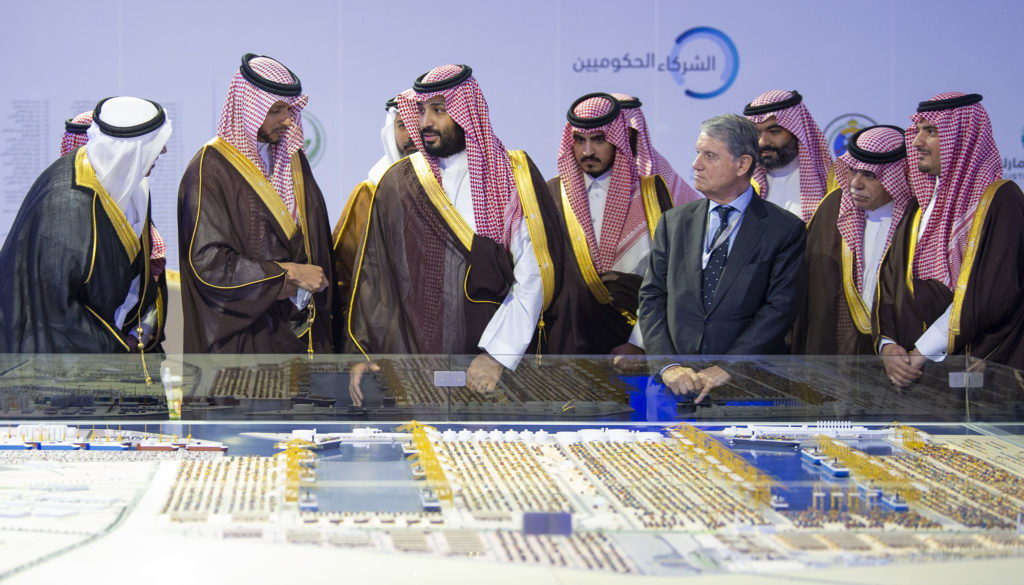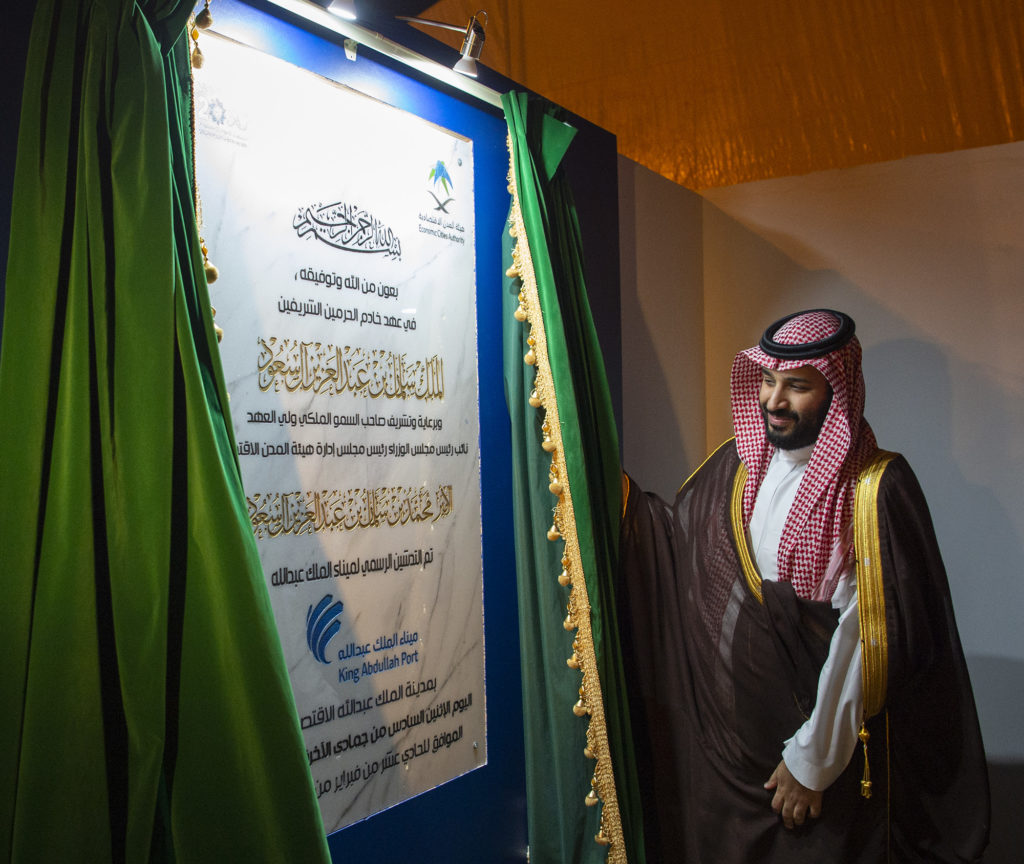HRH Prince Mohammed bin Salman, Crown Prince, Vice President of the Council of Ministers and Minister of Defense, officially inaugurated King Abdullah Port on Monday, 11 February 2019, during a visit to King Abdullah Economic City (KAEC). The visit came during a series of internal tours of projects located in the Kingdom’s provinces.
The inauguration ceremony began with a speech from the Minister of Transport and Board Member of the Economic Cities Authority (ECA), HE Dr. Nabeel M. Al-Amudi. He praised the Crown Prince’s visit and generous patronage of the official opening of King Abdullah Port, which is the first privately developed, managed and operated port in the Kingdom and region. He said: “I would like to emphasize how important this national project is, and how the achievements we are witnessing today would not have been possible without Allah, followed by the government of the Custodian of the Two Holy Mosques and his support, patronage, and commitment to advance our beloved nation.”
Chairman of the Ports Development Company (PDC), Mr. Saleh bin Ladin, welcomed the Crown Prince, and expressed his honor in opening King Abdullah Port, which is owned and developed by PDC. He commented: “King Abdullah Port has undergone major milestones during its development, two of which represent historical moments in the port’s journey. The first was the nationwide leap that occurred when the esteemed Council of Ministers approved Vision 2030 under the chairmanship of the Custodian of the Two Holy Mosques, HRH King Salman bin Abdulaziz. The second is the one we are witnessing today, as Your Royal Highnesses honors this port through its opening ceremony.”
He added: “We are looking forward to making King Abdullah Port a major logistics hub, and a key driver in the Kingdom’s logistics sector by utilizing its geographical location on one of the most important trade routes in the world, in order to attract all types of investments to the Kingdom and increase the nation’s share of global trade.”
At the end of his speech, bin Ladin thanked the port’s partners, which include international shipping companies and operators, and government agencies working at the port. He also praised the important role played by ECA, the government agency overseeing King Abdullah Port. He thanked ECA for their efforts in enabling and supporting the port’s development work, in order to achieve strategic objectives and enhance its role in meeting the needs of the growing Saudi market, in addition to contributing to advancing the national economy.
MSC Group Executive Chairman, Capt. Gianluigi Aponte, emphasized the quality of the world-class services offered by King Abdullah Port to international shipping companies. He said: “I am pleased MSC plays a vital role in developing this significant project, thereby contributing to achieving the objectives of Vision 2030. The strategic location of King Abdullah Port will enable it to effectively contribute to the socioeconomic growth of the Kingdom and the Gulf region in general, which has the potential to become a key logistics hub for global trade. We at MSC believe this region provides us with an excellent opportunity to carry out our work in container transport and port terminal activities, while ensuring the provision of high-quality services to our customers and contributing to the growth and development of our operations.”
After the speeches, honored guests watched a short film about the port’s development, followed by the announcement of MoUs signed by the port. The event was concluded with the inauguration of King Abdullah Port by the Crown Prince.

Another MoU signed by King Abdullah Port with the National Container Terminals will expand the port’s container terminal and increase throughput to seven million TEU, making it the largest container port on the Red Sea coast. The beginning of drilling operations on the north basin between the port and Huta Marine was also announced, an agreement which will add 10 million TEU of throughput and 15 million t of bulk cargo.
The inspirational concept that led to the creation of King Abdullah Port was the visionary realization that the Kingdom of Saudi Arabia needed a world class port capable of receiving today’s mega cargo ships in order to handle the increasing number of imports to fulfill the growing needs of the young and fast growing population, while also facilitating increased exports to global markets. Today, the far-sighted concept of King Abdullah Port is completely aligned with the government’s Vision 2030 for an economy that is non-dependent on oil, and boosting the Kingdom’s competitive role.
The added value of King Abdullah Port in the Kingdom’s socioeconomic development journey is based on capacity building. Saudization rates in the port have reached 61.5%, excluding labor. Eight of the largest shipping lines operate at the port to offer integrated services to importers and exporters, and the port’s development plan is proceeding at a steady pace with a clear vision to become one of the world’s leading ports. Utilizing its advanced facilities and proximity to the Bonded and Re-export Zone, and the logistics park, King Abdullah Port offers its clients logistics support to enable them to achieve their desired growth. The port has established partnerships with shipping companies, banks, and global port operators, with investments exceeding SR13 billion.
The government, represented by ECA, is responsible for overseeing, organizing, and coordinating the government agencies involved in the port’s activities, in order to ensure a smooth flow of work. King Abdullah Port is one of the latest infrastructure megaprojects in the Middle East, and is a testament to the success of public-private partnerships.




